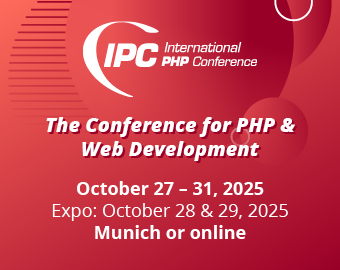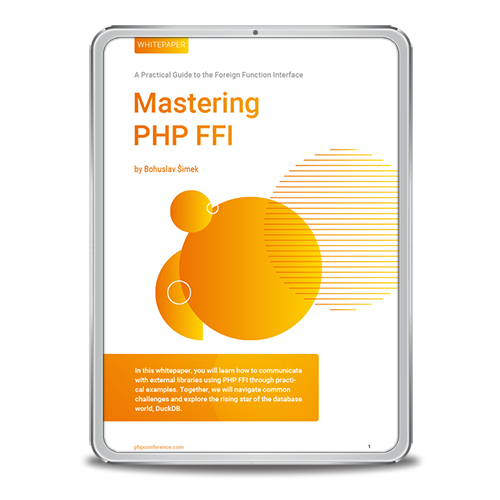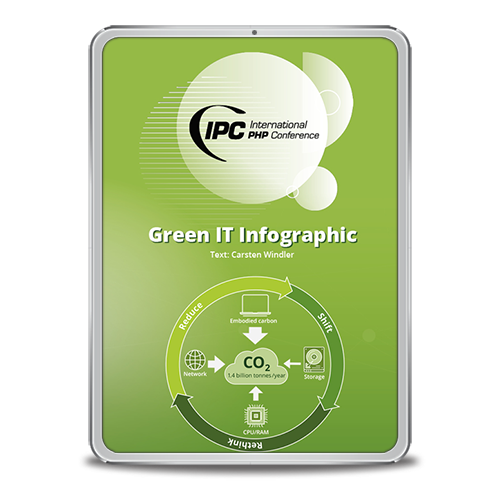Corona, home office, and finally on-site conferences again: What made 2021 special for you?
Carsten Windler: My first talk at the International PHP Conference in July 2021 was also my first remote talk due to Corona. It was a rather strange experience to talk into the camera the whole time without any direct feedback from attendees. But then IPC Munich in October this year was all the more enjoyable, since it almost felt like a “normal” conference. I also had the special pleasure of being able to contribute a keynote on my favorite topic: Green IT.
Susanne Moog: I’ve been working completely remote for many years—in 2021, many of my colleagues also switched over. For me, this was a step forward, since much more communication takes place over digital channels now; exchanging ideas has improved significantly, and now we can also hold “occasional communication” remotely, as we’d normally do when getting a coffee together. In addition, I participated in various online conferences, and—when the infrastructure was well done—had a lot of fun in “hallways” and virtual bars. Conferences in virtual worlds cannot replace the real experience, but they were, in my opinion, a good substitute in the current circumstances.
Roland Golla: As a conference topic, I like seeing a talk that has a story. It encourages me to think outside the box. But that’s not possible remotely, and it’s hardly fun for the speakers either. That’s why hybrid conferences like IPC are simply great, for unbiased conversations, beer, and humanity too. That’s what we live for—new and old friends in the PHP family.
Mark Story: There were a few things that made 2021 special for me. I was finally able to take the time to learn some new technologies. It gave me the opportunity to learn some C to design my first circuit board. It was also a good year for my open source work. The CakePHP team was able to ship a new version with a lot of features. I also took the time to learn Inertia.js and build an application that I use daily.
Jörg Moldenhauer: 2021 was the second Corona year. There was a pleasant period in the summer when the numbers dropped and we thought that normalcy might return. The conferences I attended were held online, just like last year. However, it was nice to be able to attend some training sessions on-site again. Unfortunately, there is not much left of the good times now and it looks like 2022 will be a Corona year too.
Vitalij Mik: This year, I was allowed to get into a new topic professionally: Shopware. Facing completely new requirements is really extremely exciting. Even though I already knew Symfony, I had to take a closer look at Shopware. It was exciting to still find projects that are so challenging after 10 years of professional experience. I think that’s what makes the job of being a programmer; you always have some new kind of technology or framework and it never gets boring.
Christian Dangl: Keeping things in perspective, 2021 was not very different from the previous year. However, it is clear that contact with others became increasingly important in 2021. Whereas at the beginning of the pandemic in our industry, we thought now we can “finally” work at home in peace. This changed increasingly for me.
Conversations with colleagues where you can ignore the time are now a rarity, if you even make it to the office at all. But those are exactly the special ones for me. Moments when the world seemed normal, days when our office was (half)full of colleagues, some of whom we only know digitally.
Unfortunately, I haven’t been able to attend any on-site conferences yet, but I’m looking forward to them as if I was a little kid. Personally, I was lucky enough to be able to hold many talks and webinars—but unfortunately only digitally. While many events have taken a huge qualitative step towards digitalization (kudos to Shopware Community Day and the team for the broadcast), you look forward to events that you can really “feel”.
But I think there are also many positive things that can be found in our world. Particularly in the area of digitization, many areas and markets were forced to finally replace outdated systems. So the impetus has finally been given. From that point of view, I would say that I’m glad that people have also learned to appreciate the small social things in life, while our world finally seems to be turning in the area of digitalization.
P.S: I’ve learned that even in a home office, sometimes a fallback line for your Internet connection wouldn’t be so silly.
IPC NEWSLETTER
All news about PHP and web development
How would you rate the past ~12 months for both the PHP language and the community? What was positive? What was negative? Were there any personal highlights?
Windler: It was nice to see that the PHP Conference didn’t fall asleep during the pandemic. The organizers and the community showed a lot of creativity and stamina! Above all, I think the idea of hybrid conferences worked well. The current development of PHP is still great. It’s just wonderful to see how the language continues to evolve steadily. PHP 8.1 again brings us very interesting new features, like enums or readonly properties, which allow us to write leaner, more robust code. I’m very excited to see what future releases will bring us.
But it is a real pity that Nikita Popov will no longer focus on PHP in the future. The language owes him a lot! However, I am all the more excited about the newly founded PHP Foundation, which includes some well-known names in the community. Therefore, I think the future of PHP is still secure.
Moog: More and more projects are moving to PHP 8.0, which has been a real highlight for me since I really enjoy using many of PHP 8’s features, but I’m always dependent on how compatible the packages I use are. With the last few PHP releases—both 7.4, 8.0, and 8.1—PHP has fixed a lot of minor inconveniences and is becoming more and more enjoyable. In addition, static analysis tools like PHPStan or Psalm are getting better and better and you can automatically upgrade many things with the help of Rector. Also, I should mention composer 2 here; the performance improvements were impressive.
Golla: Mental health development was definitely negative. Some of our close friends were affected badly, to the point of staying in an acute care unit. I am now taking up this topic again. I have a certain standing in the community and I’ve become aware of my responsibility again. The moment we can and must go back, the truth will become apparent. Many colleagues prefer to turn off their camera during video calls. There are reasons for that and it will take a lot of time to heal.
On the positive side, there are now more real remote jobs. Before Corona, you always had to come into the office, for reasons. Now, even clients like our funeral home have setups for video sessions. They didn’t even know what the Internet was before. That’s real progress. On the software development side, of course, things have changed: RectorPHP is a spectacular project that I really like. Personally, I’m getting more and more involved with PHPUnit, which is also developing spectacularly. PHP8 is also great—you can hardly keep up with it this year.
Story: The last 12 months certainly had some ups and downs. PHP 8.1 was released as well as a plethora of new libraries like Pest and MiniCLI. Nikic pulled out of the project and the PHP Foundation was formed. I am confident that the Foundation will find a way to keep PHP alive for a long time to come.
Moldenhauer: My highlight was trying out PHP 8 in practice. Little things like the named parameters quickly proved to be useful features that you wouldn’t want to do without. It’s also nice that attributes are now firmly integrated into the language and no longer have to be recreated via annotations in comments. Symfony version 6 was released at the end of the year. It didn’t bring any groundbreaking innovations like version 4 did, but it added some useful new improvements for existing components. By the way, all of them are also included in the LTS version 5.4, which was released at the same time.
Mik: Like every year, the language only got better and better. PHP 8.0 is already a year old, but the majority of people probably still use PHP 7.4. It’s a shame that generics still haven’t been implemented. But I think there is a reason for it because if it was easy, then we’d have them already. My personal highlight was Hacktoberfest and that I managed to fix some bugs in Shopware.
Dangl: The release of PHP 8.0, which is now a year ago, ushered in a new era of sorts for me. While versions 7.x felt very much like stabilization to me—catching up with the basic functionality of other programming languages—with 8.x you can clearly see that now PHP is modern and exciting. That said, one of my highlights was definitely when I learned about the official ENUMS making their way into PHP 8.1. I think the neighboring town could hear me when I shouted “finally!” with joy. Sometimes a highlight is just the little things.
What also makes me very happy is the release of PHPStan 1.0. I don’t know anyone who doesn’t use it actively in at least one of their projects or plans to. It’s definitely one of the most important tools whose official versioning finally arrived. And for the 1st birthday, Ondřej gave us a new task—Level 9!
From a PHP point of view, what are your future wishes? Where is there a need for improvement, or what are you missing?
Windler: I would be happy to see native support for asynchronous calls. Of course, there are already excellent extensions and libraries in this regard, but I believe that the topic would receive more attention and more use as a fixed component of PHP.
Moog: I would like to see more standards. The PHP-FIG already does a good job of defining interfaces that can be implemented by different systems to ensure interoperability. These interfaces should be used by more systems. Composer made it very easy to use packages from different developers; to me, the next logical step is more PSR standards that make interoperability even easier. In the open source area, there is still a lot of potential for cooperation. Since a lot is done in our spare time, it makes sense to work as efficiently as possible and for me, that means cooperating and being able to share implementations.
Golla: Young talent is not addressed, integrated, and promoted. The greed for full-stack developers who just work without a training period is bad. We have to become much more sustainable. Hundreds of people who want to do apprenticeships are neglected. What’s also bad is price gouging among agencies. We can barely breathe in the legacy swamp and get no spare time for open source and our passions. There is a lack of visibility as to why software quality is worthwhile.
Story: PHP is in a great position. Progress in recent PHP versions has been tremendous. But this development has not been in vain— incompatible changes have made it harder to maintain libraries and frameworks that support multiple PHP versions.
Moldenhauer: PHP could go one step further with typing. Typed arrays and variables are still missing. It would also be nice if strict types were automatically enabled in one of the next major versions, even if that would break many old applications and libraries. You have to keep up with the times. Strict typing should be standard by now.
Mik: In PHP, we work a lot with simple data structures, such as arrays, but these are not implemented in a particularly performant way. It might be desirable to be able to define data structures. We have classes, but creating them and including them via autoload is a bit of a hassle. Private classes, known from Java or structures from C++, would certainly be interesting. A structure definition that I can quickly type in a class, like an array with typehints, would be great. But that will probably never come.
Dangl: I would like to see PHP not only become modern, but also continue to work on stabilization and fundamentals to get closer to languages like C#, etc. (see ENUMS). For example, I find it practical to work with type declarations in PHP as well. But I also wish that blurring this, with the possibility of specifying “mixed” in return, or something similar, finds its way in less often. Maybe this is simply due to my own preferences as a programmer, but I’m a big fan of having as strict fundamentals in a programming language as possible, leaving little room for interpretation. I also hope that there aren’t too many more modern short syntax options integrated allowing you to do all sorts of things in one line. Again, maybe I’m old school, but I think this can lead to unnecessary errors.
Have a look into the crystal ball: What will 2022 bring us? What are you looking forward to?
Windler: The increasingly urgent fight against climate change won’t stop with us software developers. The aim is to drastically reduce global power consumption and CO2 emissions. PHP still drives a large part of web pages on the Internet and could play an important role. But this would also mean that we have to think more about our software’s efficiency. Maybe standard PHP with a few handpicked Composer packages are enough for your next project instead of the usual heavyweight framework?
Golla: In 2022, I will have my first own employee at TESTIFY—Agency for Tests. That’s super exciting and wonderful. That’s why I’m heavily involved in business management right now. The market is also exciting. At the beginning of the pandemic, many people’s working hours were immediately reduced. It wasn’t clear that it would take so long. But before that, we were told that we would be allowed to clean up once we had time. And the freelancers? Even before Corona, they had an astonishingly good order situation and hourly rates. This triggered a trend: occasionally some freelancers have joined forces. Employee security took a very serious crack. That’s an exciting starting point. Good people left teams. They’ve been stuck in really bad legacy projects for years and don’t have any current know-how. Too expensive and too bad. I personally have some development scenarios. But that’s not for here. I’ve had this topic come up before. [1] https://blog.nevercodealone.de/webdesign-agenturen/ Yes, it will certainly be an exciting year and I’m looking forward to it.
Story: I’m excited to see what the PHP Foundation has in store once it gets going. I’m also looking forward to the return of real events and conferences that I’ve missed over the past two years. I also hope to see the public slowly lose interest in cryptocurrencies and related digital assets as the scams continue to pile up. I’d like to see the great minds and capable engineers working on these technologies find solutions that help realize the ambitions of a decentralized web, without the underlying fraud.
Moldenhauer: I’m looking forward to PHP 8.1 and native enums. It’s already been released this year, but upgrading all applications will probably take until next year. Then I can finally work with it effectively.
Mik: I think Fibers and Attributes, which we now have in PHP, will be powerful tools that will significantly increase PHP’s performance in the near future. With Fibers you can run multiple processes in parallel and get the result later. API libraries like Guzzle or database libraries like Doctrine can certainly benefit from this. Since PHP 7.4 reaches its end of life in 2022, PHP 8 will also rely more on attributes instead of annotations, which could also have an impact on performance. In any case, I’m looking forward to PHP gaining even more performance.
Dangl: Well, I think there’s no way to get around mentioning the new PHP Foundation here. It’s a step that, at the time, seems absolutely right to me. Nothing is a better turbocharger for a project than having developers who can work on it full time. For me, it remains to be seen how quickly PHP will continue to develop and what features we’ll see in the future. But who knows, maybe in the not too distant future we will already be using PHP 9.0. Apart from PHP, I see a clear trend in the area of testing. Frameworks and tools like Cypress that release new features and versions at lightning speed help make testing and QA even easier and more palatable. So I’m not surprised that in 2021, testing and pipelines attracted a lot of attention again. From there, I think 2022 will see another boost in the automated QA space.
Our PHP Experts
Web: https://www.youtube.com/c/VitalijMik






